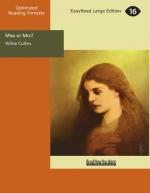TENTH SCENE.
Green Anchor Lane.
An hour later than the time at which he had been expected, Richard Turlington appeared at his office in the city.
He met beforehand all the inquiries which the marked change in him must otherwise have provoked, by announcing that he was ill. Before he proceeded to business, he asked if anybody was waiting to see him. One of the servants from Muswell Hill was waiting with another parcel for Miss Lavinia, ordered by telegram from the country that morning. Turlington (after ascertaining the servant’s name) received the man in his private room. He there heard, for the first time, that Launcelot Linzie had been lurking in the grounds (exactly as he had supposed) on the day when the lawyer took his instructions for the Settlement and the Will.
In two hours more Turlington’s work was completed. On leaving the office—as soon as he was out of sight of the door—he turned eastward, instead of taking the way that led to his own house in town. Pursuing his course, he entered the labyrinth of streets which led, in that quarter of East London, to the unsavory neighborhood of the river-side.
By this time his mind was made up. The forecast shadow of meditated crime traveled before him already, as he threaded his way among his fellow-men.
He had been to the vestry of St. Columb Major, and had satisfied himself that he was misled by no false report. There was the entry in the Marriage Register. The one unexplained mystery was the mystery of Launce’s conduct in permitting his wife to return to her father’s house. Utterly unable to account for this proceeding, Turlington could only accept facts as they were, and determine to make the most of his time, while the woman who had deceived him was still under his roof. A hideous expression crossed his face as he realized the idea that he had got her (unprotected by her husband) in his house. “When Launcelot Linzie does come to claim her,” he said to himself, “he shall find I have been even with him.” He looked at his watch. Was it possible to save the last train and get back that night? No—the last train had gone. Would she take advantage of his absence to escape? He had little fear of it. She would never have allowed her aunt to send him to Lord Winwood’s house, if she had felt the slightest suspicion of his discovering the truth in that quarter. Returning by the first train the next morning, he might feel sure of getting back in time. Meanwhile he had the hours of the night before him. He could give his mind to the serious question that must be settled before he left London—the question of repaying the forty thousand pounds. There was but one way of getting the money now. Sir Joseph had executed his Will; Sir Joseph’s death would leave his sole executor and trustee (the lawyer had said it!) master of his fortune. Turlington determined to be master of




